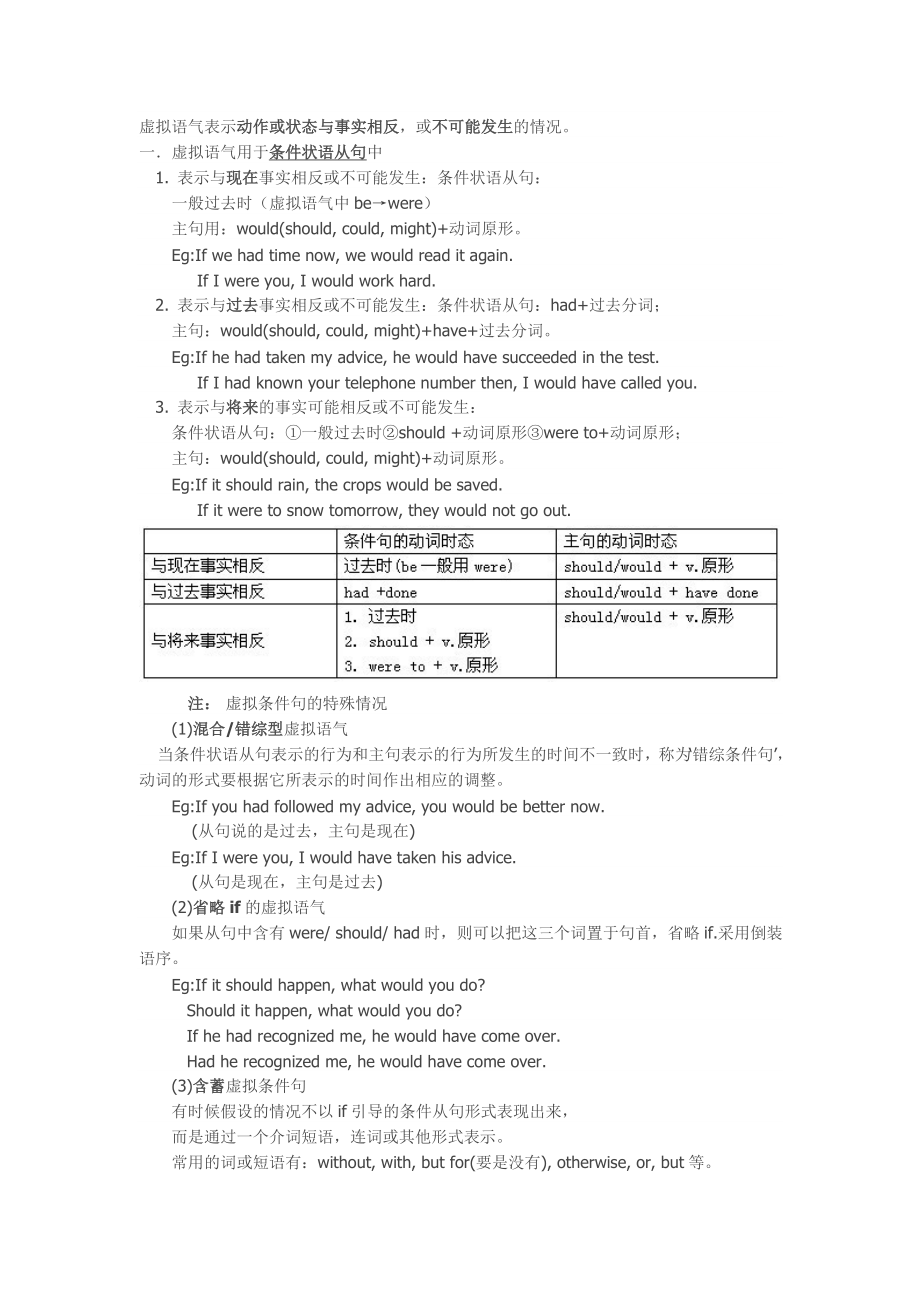 【虚拟语气】重点归纳
【虚拟语气】重点归纳



《【虚拟语气】重点归纳》由会员分享,可在线阅读,更多相关《【虚拟语气】重点归纳(4页珍藏版)》请在装配图网上搜索。
1、虚拟语气表示动作或状态与事实相反,或不可能发生的情况。一虚拟语气用于条件状语从句中1. 表示与现在事实相反或不可能发生:条件状语从句:一般过去时(虚拟语气中bewere)主句用:would(should, could, might)+动词原形。Eg:If we had time now, we would read it again. If I were you, I would work hard.2. 表示与过去事实相反或不可能发生:条件状语从句:had+过去分词;主句:would(should, could, might)+have+过去分词。Eg:If he had taken my
2、advice, he would have succeeded in the test. If I had known your telephone number then, I would have called you.3. 表示与将来的事实可能相反或不可能发生:条件状语从句:一般过去时should +动词原形were to+动词原形;主句:would(should, could, might)+动词原形。Eg:If it should rain, the crops would be saved. If it were to snow tomorrow, they would not g
3、o out.注:虚拟条件句的特殊情况(1)混合/错综型虚拟语气 当条件状语从句表示的行为和主句表示的行为所发生的时间不一致时,称为错综条件句,动词的形式要根据它所表示的时间作出相应的调整。Eg:If you had followed my advice, you would be better now. (从句说的是过去,主句是现在)Eg:If I were you, I would have taken his advice. (从句是现在,主句是过去)(2)省略if的虚拟语气如果从句中含有were/ should/ had时,则可以把这三个词置于句首,省略if.采用倒装语序。Eg:If i
4、t should happen, what would you do? Should it happen, what would you do? If he had recognized me, he would have come over. Had he recognized me, he would have come over.(3)含蓄虚拟条件句有时候假设的情况不以if引导的条件从句形式表现出来,而是通过一个介词短语,连词或其他形式表示。常用的词或短语有:without, with, but for(要是没有), otherwise, or, but等。Eg:Without your
5、 help(=If we had not had your help),we could not have succeeded. But for electricity(=If there were no electricity,there would be no modern industry. He felt very tired yesterday, or/ otherwise he would have attended the party.(4)在if it were( had been )not for .句型中的虚拟语气虚拟语气也常用于if it were/(had been)
6、not for .句型中,意为要不是由于。Eg:If it were not for peace, we could not be living a happy life today. If it had not been for your timely help, I would have gone bankrupt.二虚拟语气用在名词性从句中1.主语从句中的虚拟语气这种虚拟语气主要用在it is+形容词(名词,过去分词)+that+主语+should+动词原形(should可以省略)这种结构中。常见的这类形容词有:advisable, anxious, better, desirable,
7、 surprising, natural, necessary, strange, important, regretful.常见的这类过去分词有:decided, demanded, recommended, requested, desired, required, ordered, suggested.常见的这类名词有:duty, pity, no surprise, no wonder, regret, shame. Eg:It was suggested that he(should)join the club activities.It is strange (surprising
8、, disappointing) that she (should) not have been invited.It is a pity that he (should) refuse to accept the offer.2.宾语从句中的虚拟语气wish后面所跟宾语从句谓语动词用虚拟语气(意为要是,但愿就好了),其形式主要有三种:表示对现在情况的虚拟:wish后接一般过去时的从句表示对过去情况的虚拟:wish后接过去完成时/should,could have done表示对将来情况的虚拟:wish后接would,could+动词原形 Eg:I wish it were spring al
9、l year round. I wish it would be fine tomorrow. She wished she had stayed at home. 在表示建议,命令,要求等动词后的从句要用(should)+动词原形。此类动词有:suggest, advise, propose, demand, require, insist(要求), order, prefer, command, ask, request.Eg:The teacher ordered that all the books (should) be handed in on time.注:当suggest表示暗
10、示,说明之意;insist表示坚持认为,坚持说之意时,从句不用虚拟,用正常的陈述语气。Eg:The man insisted that he had never stolen the money. The smile on his face suggested that he was satisfied with life.3. 表语从句和同位语从句中的虚拟语气在表示建议,命令,要求的名词后的表语从句或同位语从句中的谓语动词要用(should)+动词原形。常见名词有:advice, desire, request,demand, proposal, suggestion, preference
11、, requirement, order. Eg:He gave orders that the guests (should) be hospital entertained.His proposal is that we (should) get rid of the bad habits.三虚拟语气在其他情况中的使用1.在as if/ as though引导的状语从句中,若从句与事实相反,则要用虚拟语气。其形式如下:主语+as if/ though +主语+一般过去时(从句的动作与主句同时发生)主语+as if/ though +主语+would/could+动词原形(从句的动作相对主句
12、来说在将来发生)主语+as if/ though +主语+过去完成时(从句的动作先发生于主句动作之前)Eg:He talks as if he knew all about it. She speaks English well as if he had studied in America.He learns English so hard as if he would go abroad.2.在it is (high) time that 句型中也用虚拟语气,从句常用过去式,有时也用should +动词原形,表示早该做而没做的事,含建议的意味。 Eg:It is time that we
13、went home. 注:此句型中,注意与It/This is the +序数词+time that+现在完成式的区别。Eg:This is the first time that I have been here.3.would rather后接动词原形,但接从句时要用虚拟语气(宁愿,但愿)。Would rather +主语+一般过去时(表示与现在或将来相反)Would rather +主语+过去完成时(表示与过去相反)Eg:Id rather he didnt go now. Id rather you hadnt done it. 4.if only后接从句也用虚拟语气,其形式与wish的用法一致。5. 动词hope, intend, mean, plan, want, think等词用过去完成的形式,表示的意思为本想,本打算,本认为Eg:He had meant to buy the furniture last week, but it rained.(他上周本打算去买那件家具,但却下雨了)非真实条件句中的虚拟语气(以动词do为例)
- 温馨提示:
1: 本站所有资源如无特殊说明,都需要本地电脑安装OFFICE2007和PDF阅读器。图纸软件为CAD,CAXA,PROE,UG,SolidWorks等.压缩文件请下载最新的WinRAR软件解压。
2: 本站的文档不包含任何第三方提供的附件图纸等,如果需要附件,请联系上传者。文件的所有权益归上传用户所有。
3.本站RAR压缩包中若带图纸,网页内容里面会有图纸预览,若没有图纸预览就没有图纸。
4. 未经权益所有人同意不得将文件中的内容挪作商业或盈利用途。
5. 装配图网仅提供信息存储空间,仅对用户上传内容的表现方式做保护处理,对用户上传分享的文档内容本身不做任何修改或编辑,并不能对任何下载内容负责。
6. 下载文件中如有侵权或不适当内容,请与我们联系,我们立即纠正。
7. 本站不保证下载资源的准确性、安全性和完整性, 同时也不承担用户因使用这些下载资源对自己和他人造成任何形式的伤害或损失。
